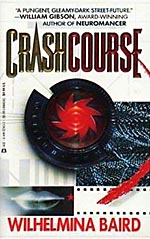
![]() Sable Aradia
Sable Aradia
10/22/2016
![]()
Read for the LGBTQ Speculative Fiction Reading Challenge, the Second Best Reading Challenge, and the Women of Genre Fiction Reading Challenge.
I originally chose to read this book because I needed to read women I had not read for the Women of Genre Fiction challenge, this one had been nominated for the PKD and Locus sci-fi awards, and the premise sounded interesting. It turned out to conveniently be also suited to two other challenges that I was doing. The Second Best challenge is to read nominees for major sci-fi and fantasy awards that didn't actually win, which I just started doing late in the year; and I didn't find out until after I had started reading it that the three main characters - Cass, the protagonist, her boyfriend Dosh, and his boyfriend and Cass's sometime lover Moke, are a bisexual polyamorous triad. Well; it's not clear if Cass is bisexual (though she might be; there's a scene later on in which a woman tries to seduce her, but the circumstances are a bit complicated and I'm not sure how she would have reacted had the situation been different), but the guys definitely are. Weirdly, this is something that seems to have been either missed or completely ignored by the people who wrote the blurb for the book, but it's clearly stated; although, to give sincere credit where it's due, this is treated casually, and is not harped on as a major plot point, other than in how it affects the relationship between the three major characters; which is worthy on its own of a tip of the hat to a book written in the 90s. (I was thrown out of a restaurant for being kissy with my girlfriend in 1992; that's where we were in terms of LGBTQ civil rights).
Cass is a thief, Dosh is a prostitute, and Moke is a street artist. They live together and try to make things work on the streets of a cyberpunk future. There are four classes of people; the Umps (the street folk and the common poor); the Techs, the Arts, and the Aris (who are the ruling, moneyed elite; owners of corporations and the like, who have vast powers in this dystopian future). When Dosh gets tortured once too often by a violent client, he signs their triad up to participate in a big-money film. The catch is that these modern films are designed not only to tell you a story, but to make you feel the emotions of the participating characters. Which means that they use real people living their real lives, and you often can't tell where reality ends and the movie begins.
A handful of things immediately happen and you're left to guess which ones are part of the show (if any); someone tries to kill Cass for refusing a contract for a heist; a young, lost girl from a higher class who ran away to get away from her abusive father ends up being rescued by the boys of the trio, who take her in; and a high-class Ari art collector offers to patronize Moke (in the classic sense of supporting and funding his work). And... go!
It's great stuff. Much of it centers around these three very well-written and very human characters being human. All of their strengths and all of their flaws come into play, and an astute reader can see how things may have unfolded in an entirely different way if the three had been different people. The ending is not quite what you expect either. The writing is hypnotic and it takes you immediately along for the ride. We see the world through Cass' eyes, speaking in a very personal first person using the slang and the context of her time period (which is completely self-invented; and there's only the faintest trace of 1990s roots that perhaps no one who wasn't a youth in the 1990s might notice). Once the action starts you don't want to put it down.
There is one glaring plot hole that is never quite resolved. It becomes clear later on that the viewer of the video movie will be seeing and feeling things through the perspective of the actors. So then why are real people with real lives necessary at all? Still, if you close your eyes and ignore that, the book is truly excellent. It's why I didn't give it a five star rating though.
This book was a very influential one, perhaps directly leading to our later fascinations with cyberpunk and dystopia, and virtual reality-enhanced art, so definitely pick it up and give it a try. I just might pick up the sequels; all the other reviewers I've read say they aren't up to the caliber of this one, but this one is good enough that they might be able to afford the loss.